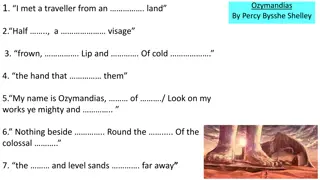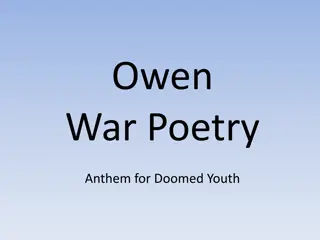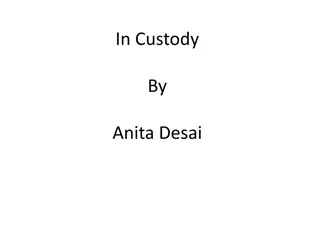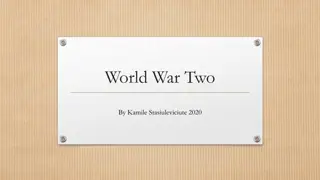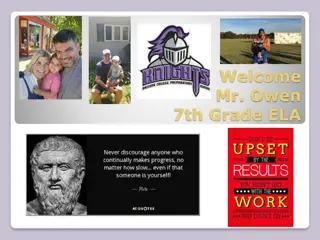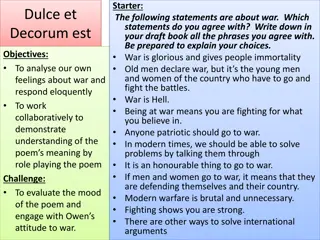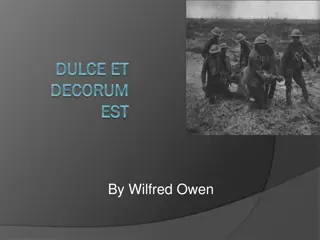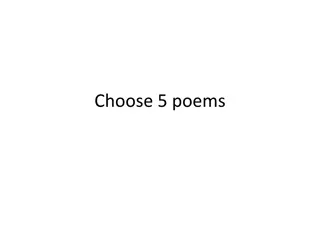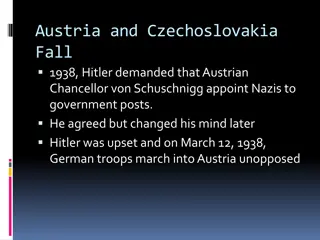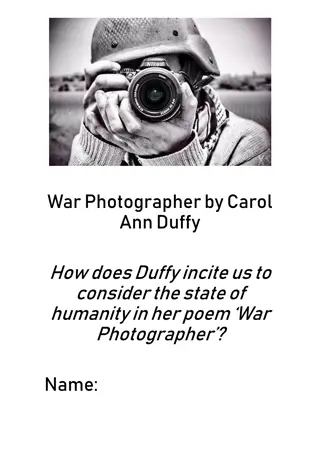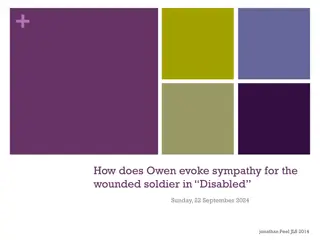Insights into War Poet Wilfred Owen
Wilfred Owen, a renowned war poet, lived a tumultuous life marked by his firsthand experiences in World War I. Through his poignant poetry, influenced by his time in the trenches and his friendship with Siegfried Sassoon, Owen conveyed the harsh realities of war and its impact on soldiers. Explore Owen's biography, his tragic death on the battlefield, and the profound depth of emotion reflected in his works like "Dulce et Decorum Est."
Download Presentation

Please find below an Image/Link to download the presentation.
The content on the website is provided AS IS for your information and personal use only. It may not be sold, licensed, or shared on other websites without obtaining consent from the author.If you encounter any issues during the download, it is possible that the publisher has removed the file from their server.
You are allowed to download the files provided on this website for personal or commercial use, subject to the condition that they are used lawfully. All files are the property of their respective owners.
The content on the website is provided AS IS for your information and personal use only. It may not be sold, licensed, or shared on other websites without obtaining consent from the author.
E N D
Presentation Transcript
Dulce et Decorum Est Wilfred Owen
Wilfred Owen When we study poetry, it is sometimes helpful to know about the poet. If you were writing a poem, you wouldn t write about something you didn t know! It s the same in poetry - learning about the poet tells us about their feelings and ideas. Look at the picture on the right - what can you guess about Wilfred Owen?
Wilfred Owen Wilfred Owen was one of the most famous war poets in English literature. He was born on March 18, 1893, in Oswestry along the Welsh border. In 1913, he had traveled to France as a part-time teacher in the Berlitz School of Languages to sustain a living. In 1915, he returned home after the outbreak of war and became a member of the Artist s Rifle. Before the year ended, he went to France for the front line battle. Letters to his mother kept him alive as he described each phase of being a military man. On May 2, 1917, he returned home after a shell-shock incident which made him unfit to lead the troops. He met Siegfried Sassoon, the poet who influenced him to utilize his tragic experiences and nightmares of the war. Together with Sassoon, Robert Graves expanded his literary world. In 1918, he returned to the front line in France. He also began writing and rewriting poems. He was awarded with the Military Cross for his bravery and leadership during the battle in Joncourt.Wilfred was preparing to publish his first collection when he died on November 4, 1918, as a result of a head shot while crossing the Sambre-Oise canal at Ors. Seven days later, his family received a telegram about his death.
Owen went to France to take part in the war. He wrote his mother letters whilst he was there Owen returned home and joined the Army Owen met Siegfried Sassoon who told him to use his experience to write poetry Owen went to France to become a part time teacher The war began Owen returned home after being shell shocked He went back to the war and unfortunately died by being shot in the head Owen was born
So! What do we know? Wilfred Owen went to war himself, so his poems are of his own experiences - what he saw, heard and felt during his time as a soldier. Owen was encouraged to write about his experiences by his friend, Sassoon. He spent a lot of time in and out of the army - Owen is known for writing about how bad it was for soldiers. He tried to tell his readers how awful it really was to be in the war.
Dulce Et Decorum Est This is one of Owen s most famous poems - does it look like English to you? If not, can you guess which language it is in?
Latin Dulce Et Decorum Est is Latin - it means It is sweet and fitting It comes from a saying, Dulce Et Decorum Est, pro patria mori which means It is sweet and fitting to die for one s country. Do you think Wilfred Owen thought it was sweet and fitting (positive) to die for his country?
First stanza Bent double, like old beggars under sacks, Knock-kneed, coughing like hags, we cursed through sludge, Till on the haunting flares we turned our backs, And towards our distant rest began to trudge. Men marched asleep. Many had lost their boots, But limped on, blood-shod. All went lame; all blind; Drunk with fatigue; deaf even to the hoots Of gas-shells dropping softly behind.
Stanza 2 Gas! GAS! Quick, boys! An ecstasy of fumbling Fitting the clumsy helmets just in time, But someone still was yelling out and stumbling And flound ring like a man in fire or lime. Dim through the misty panes and thick green light, As under a green sea, I saw him drowning. In all my dreams before my helpless sight, He plunges at me, guttering, choking, drowning.
Last stanza If in some smothering dreams, you too could pace Behind the wagon that we flung him in, And watch the white eyes writhing in his face, His hanging face, like a devil s sick of sin; If you could hear, at every jolt, the blood Come gargling from the froth-corrupted lungs, Obscene as cancer, bitter as the cud Of vile, incurable sores on innocent tongues, My friend, you would not tell with such high zest To children ardent for some desperate glory, The old Lie: Dulce et decorum est Pro patria mori. enthusiastic





